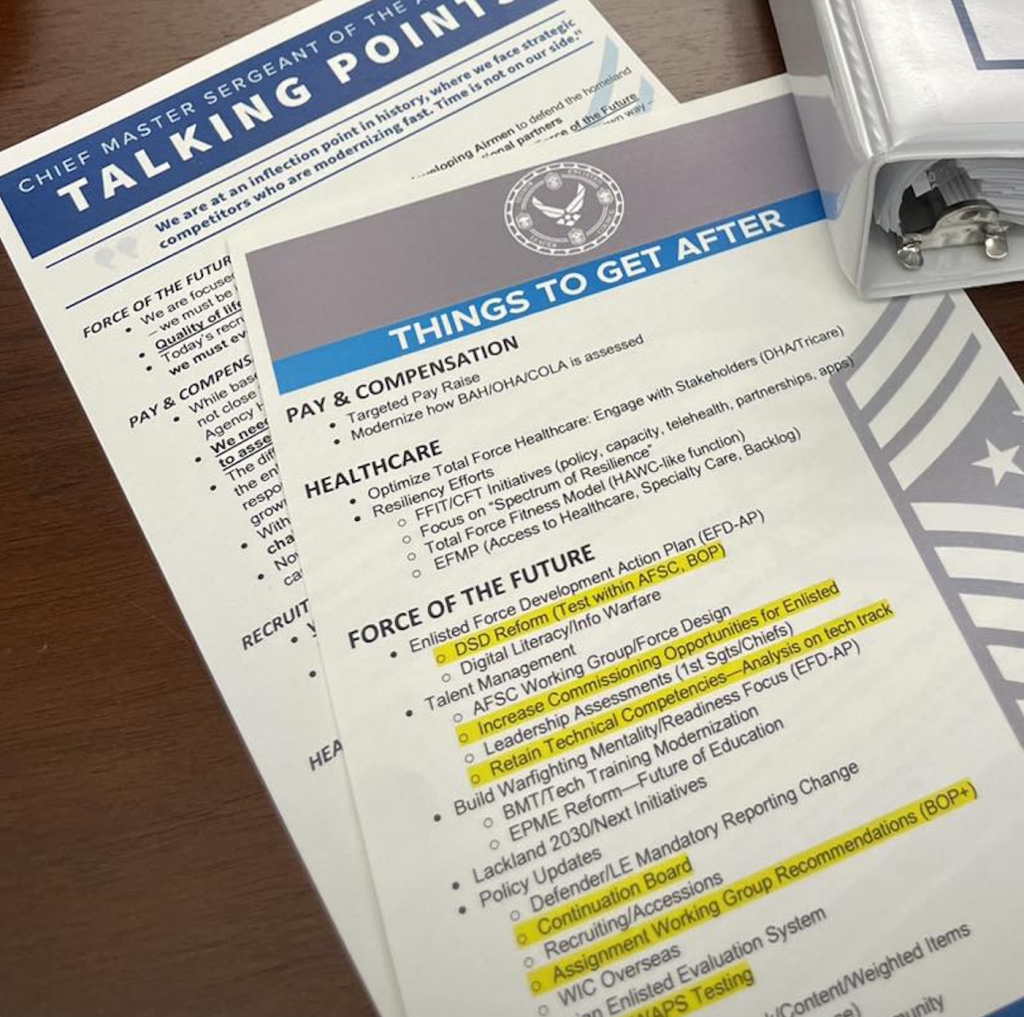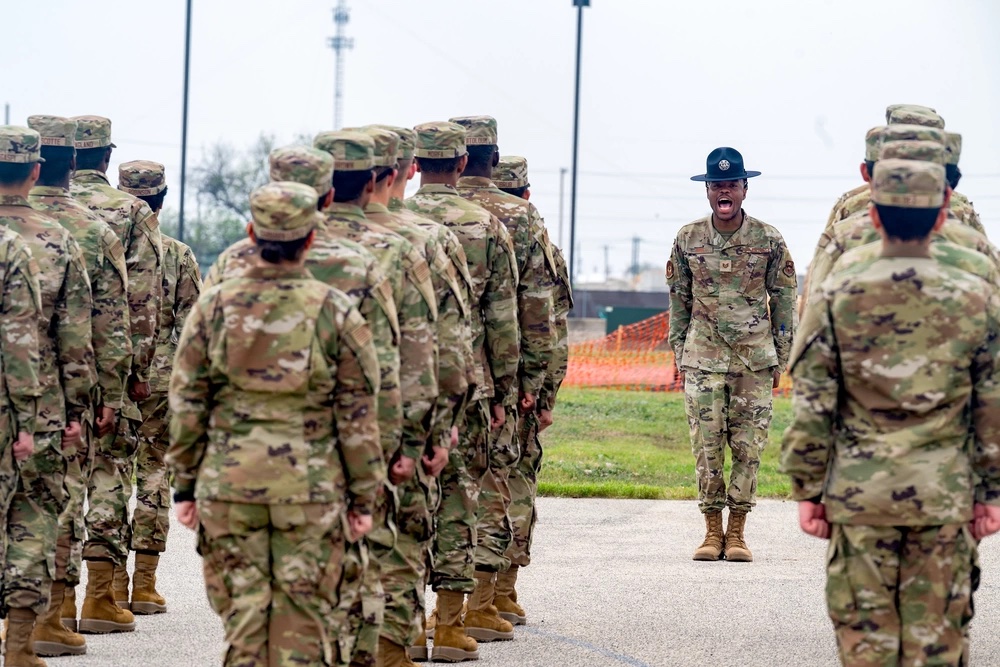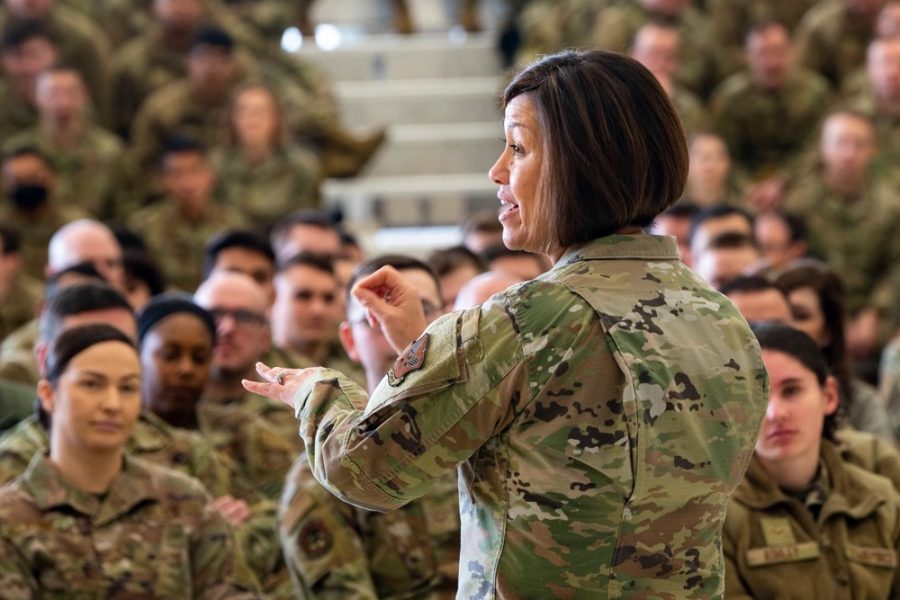Editor’s Note: This is the first of a two-part series about Chief Master Sergeant of the Air Force JoAnne Bass’ efforts to help build the Air Force of the future. Part 2 is now available here.
Chief Master Sergeant of the Air Force JoAnne S. Bass has a long list of ideas to help the Air Force better retain its enlisted talent—but six of them in particular may be in line for action sooner rather than later.
In a July 18 social media post, Bass shared a list of “Things to Get After” ahead of engagements with Congress in which she and Air Force leadership share their priorities and goals with lawmakers.
The document was extensive, covering more than 20 different lines of effort, and generated plenty of discussion from Airmen. But six in particular were highlighted:
- Reforming developmental special duties
- Increasing commissioning opportunities for enlisted Airmen
- Retaining technical competencies
- Setting up continuation boards
- Improving the Air Force’s assignment policies
- Digitizing the Weighted Airman Promotion System (WAPS) test
“We have to be deliberately focused on the force of the future,” Bass told Air & Space Forces Magazine in an exclusive interview, saying she highlighted those six in hopes that “we can cause some really strong momentum and get after them, probably quicker than some of the other ones.”
Now, as Bass nears the fourth and likely last year of her tenure as CMSAF, she offered insight into some of her top priorities.

Developmental Special Duty Reform
Developmental Special Duties (DSD) are positions in the Air Force that play a key role in training and educating recruits and Airmen, such as recruiters, military training instructors, and professional military education instructors. While the positions are crucial in developing personnel, they can be a lateral career move or even a step back for the Airmen who take them on.
For example, a maintenance Airman may have to take time away from maintenance work during a DSD as a military training instructor while their peers continue to advance. Bass wants to make sure the Airmen who serve in DSD feel well-taken care of, which will hopefully make it less of a sacrifice to perform DSD and have a positive effect on the work they do developing current and future Airmen.
“We need to make sure that we show as an Air Force that we value our DSDs,” she said. For example, “we ought to make sure that, while you’re serving as a military training instructor, that it is competitive, that it is challenging, that it is growing you but we’re also taking care of you while you’re serving in that position.”
Specifically, Bass mentioned providing base of preference to DSD Airmen at the end of their special duties. She also mentioned giving DSD Airmen a better chance to compete for promotion during their special duty, rather than afterwards as is typically the case.
“I think we can do better than that,” the chief said. “If the folks that we’re selecting into these special duties are truly the best of the best, then we have an opportunity to compete them against their peers from their career [Air Force Specialty Codes].”
Bass also called for taking a close look at the list of positions that count as DSDs.
“If we have too many special duties, then there’s nothing special about them,” she said. “Over time we’ve put more special duties under the umbrella of DSD and to some degree we’ve watered it down. We’ve got to get back to the core special duties that we believe are foundational to our institution.”
The exact plan for implementing these steps is yet to be determined. For now, Bass said there is a working group studying the DSD program to produce recommendations for modernizing it. She expects to have updates on the effort “within the next few months.”
“These are the folks who are bringing people into the Air Force and training, developing and educating them,” she said. “It should be a highly-competitive process … how are we making sure that we’re managing the talent within those special duties?”

Increasing Commissioning Opportunities for Enlisted Airmen
The Air Force needs talented officers, and Bass said the best talent pool can be found in the service’s enlisted corps. There are a number of pathways for enlisted Airmen to commission, including Officer Training School, the Air Force ROTC enlisted commissioning program, and the senior enlisted commissioning programs, which have pathways for Airmen with and without a bachelor’s degree.
However, the number of Air Force officers with prior enlisted service is still fairly small: 9,744 out of around 60,000, split relatively equally among those with one to four years of experience in the enlisted ranks, those with five to eight years enlisted time, and those with eight years or more, according to data provided by Bass’ office. The chief hopes to bump up the number of enlisted Airmen who pursue the commissioned route.
“We have such a strong talent pool within the enlisted force,” she said. “My intent is really to just increase the opportunities and raise the percentages of those who already have prior enlisted experience.”
In the past, the Air Force has tried to encourage more enlisted Airmen to commission by allowing older Airmen to do so and by establishing a pipeline for enlisted Airmen to become commissioned pilots. Bass did not mention specific ideas for new pathways or new methods of encouraging more enlisted Airmen to compete for a commission, but she mentioned feedback that every year, the number of enlisted Airmen who can compete for a commission is affected by the number of civilians who direct commission into the service.
“That’s some of the feedback that I hear and that’s what we’re trying to get after,” she said. “As we look at what kind of [company and field grade officers] we need leading our force in the future, that talent pool is within that enlisted force.”
Retain Technical Competencies
Bass also said she does not want to give enlisted Airmen who are experts in their field a reason to leave the service.
“We cannot afford to lose technical competency out of our Air Force, especially as it relates to future conflict and in the information domain and the cyber domain,” she said. “In order to do that, analysis needs to be done on managing our talent.”
The chief said external think tanks and working groups in the Air Force are studying how to retain Airmen in technical career fields, specifically in cyber and information. The branch has been working on the problem for years—in September, it offered more reenlistment bonuses for cyber Airmen even while cutting the incentive pay for other non-tech jobs. In 2021, the Air Force also reclassified cyber enlisted Airmen as an operational role rather than as a communications support role. The move was meant in part to “provide manpower to support the Air Force cyber mission,” according to a press release at the time.
“We’ve got to have subject matter experts who stay technical only and not necessarily have to go, for instance, a leadership route,” Bass said. “That’s what we’re looking at.”
The chief said the working groups are taking a close look at different models for retaining technical experts. She mentioned that the Army, Navy, and Marine Corps have warrant officer or limited duty officer roles, which help retain subject matter experts without pushing them into strictly leadership or administrative positions. In the Marine Corps, master sergeants and master gunnery sergeants also “provide technical leadership as occupational specialists in their specific [military occupational specialty],” according to the Marine Corps website.
“I think the Air Force has to, as we’re developing our broader talent management model, make sure that we have a pathway to be able to retain our technical expertise,” she said.
When asked if the Air Force ought to implement a warrant officer system, Bass said she was “definitely not opposed to the suggestion of that. We just have to do the analysis to make sure that is what is best for the U.S. Air Force.”
Like with some of the other measures, there are no concrete next steps laid out yet, but the chief said she hopes to have progress updates within the next few months. With all six of the priorities, her Facebook post was meant in part to help light a fire for faster movement.
“That’s kind of why I have them highlighted,” she said. “We’ve got to create some momentum and start to drive toward that faster. … Our competitors are modernizing fast and time is not on our side.”
